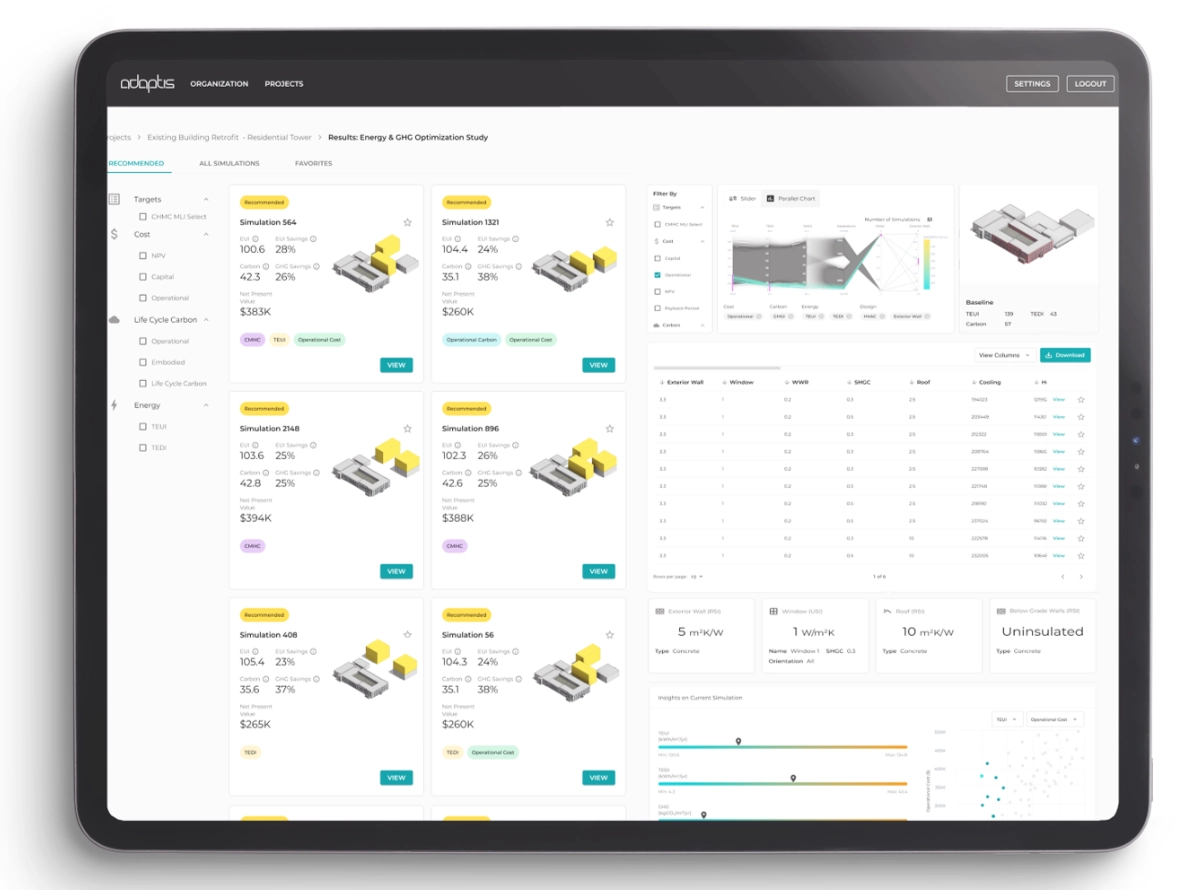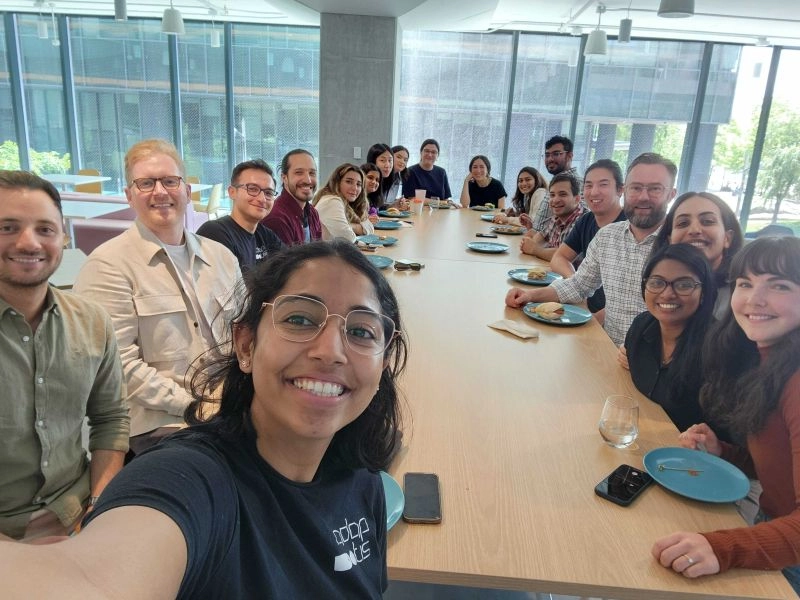Part of the challenge in creating a more sustainable built environment is that the longevity of our buildings often leaves us operating structures that are inefficient and outdated. Because 80% of today’s office buildings will still be in-use by 2050, the U.S. needs to triple its retrofit rate to meet net-zero targets. This will not only require significant investment to complete the updates but also innovation to ensure the process is efficient and our buildings resilient. With this critical challenge in mind, we are so excited to announce our investment in Adaptis, the decision-making platform that bridges the gap between financial planning and carbon optimization for real estate owners, developers, asset managers, and operational teams.
The current capital planning workflow for decarbonization and resilience is stymied by static reports from bespoke consultants and lacks a dynamic software platform to allow for double-bottom line scenario analysis. What asset managers need is a whole lifecycle decision support tool that they can toggle to show the tradeoffs in carbon, the projected energy use of the building, the Scope 1-3 impacts, the relevant regulatory requirements, and the projected NOI of the project once completed to recoup the cost of the initial investment.
Pressure from capital markets, national and local regulations, and the public are driving many building owners to develop pathways to decarbonizing their global building portfolios. While we are just beginning to see regulation drive decarbonization in the built environment in the United States with BERDO, Local Law 97, CA State Bill 253 and 261 and others, in Europe and Canada more mature and far-reaching legislation has spurred asset owners to build lower carbon projects and develop decarbonization plans for their existing portfolios. The scale of the investment required to meet Canada’s building performance standards is $15 billion per year for residential buildings and $6 billion per year for commercial and institutional buildings.
Founded in Toronto by two PhDs, Sheida Shahi and Aida Mollaei, Adaptis solves the capital planning questions that asset owners and developers are asking through a proprietary simulation engine that provides dynamic scenario analysis. To bring about a better built world that has less embodied and operational carbon, building owners, developers, and designers need tools to make data-driven decisions to maximize ROI, reduce inefficiencies, and achieve decarbonization goals faster and more effectively. Adaptis provides these tools and more.
Today, when asset managers are faced with a decision on what to build, buy, or retrofit, they often hire consultants to prepare one-off project-level analysis to inform their decision. These reports typically come in the form of PowerPoints and papers and have several functional drawbacks:
- They are timely and expensive to produce (often costing $30-40k per project and taking months to deliver).
- They are static and cannot be updated if any variables in the project change.
- They cannot be re-used or re-applied to other similar projects; they are, in essence, stranded data assets used once and then disposed of.
When an asset manager has a finite pool of capital with which to allocate to a retrofit of a building in their portfolio, they need a dynamic tool to compare the pros and cons of several projects at once to determine the best possible use for the funds among a set of options. The current services available to these asset managers are bespoke consulting and energy modeling service providers, which we feel are not able to deliver at the scale necessary to meet the coming wave of demand. Adaptis is purpose-built to solve this problem and timed to ride the tailwinds of decarbonization investment that have begun to accelerate in recent years.
The Adaptis platform allows customers to input data on a building’s performance and runs thousands of simulations to select the optimal plan that maximizes for two metrics in two critical areas:
- Financial metrics such as capital cost, NPV, and NOI.
- Environmental metrics like EUI, TEDI, operational carbon & embodied carbon.
The Adaptis simulation engine takes in building performance data from a developer, asset owner, or architect to inform recommendations around the optimal capital plan to boost a building’s NOI and reduce its carbon footprint.

The Adaptis platform helps building owners and AEC professionals reduce emissions, minimize the embodied carbon, and divert waste from landfills.
Once a customer has chosen a project plan the Adaptis platform shows them the capex required, penalties avoided, scheduling considerations, the overall C02 reduction, and the individual effectiveness of each intervention in terms of mgC02 removed per square meter by changing features such as the building envelope, lighting, or HVAC system.
The Adaptis decision-support platform then becomes the system of record for capital allocation decisions going forward, and a tool that asset managers can use on an ongoing basis for project planning, building operations, and even circularity planning.
Our team first met Adaptis in November of 2022 when Sheida and Aida were raising the company’s pre-seed round led by 2048 Ventures. During our initial meeting with the co-founders, we were impressed by their educational and professional backgrounds, their understanding of the problem with financial planning and carbon optimization today, and especially the earned secrets they had learned from years working in the industry, all of which informed the Adaptis platform. By their next fundraise in February of 2024, Adaptis had 10x’d revenue—exceeding their sales target by 3x—and were embarking to raise their seed round. By this time, it was clear to us that the team had positioned themselves to scale by building the necessary infrastructure and fine-tuning their offerings to match the market opportunity.
Adaptis founders Sheida and Aida met while pursuing their PhDs in circular engineering at the University of Waterloo. Sheida, the company’s CEO, is an architect by background with a career focused on sustainability performance while Aida’s background is in civil engineering research. Their PhD research and experience working in the field led them to build simulation engines for energy and emission reduction, as well as carbon optimization. Additionally, Sheida has experience in the consulting world. With this experience, she is looking to automate and expand, and she is also intimately familiar with the customer problem and how it has historically been addressed. Both Sheida and Aida have grown Adaptis to more than 20 people, whose backgrounds are primarily in energy modeling and sustainability consulting—an ideal team to support the company’s plans with this infusion of capital.

The Adaptis team at work, including Co-founder and CTO Aida Mollaei center, arm outstretched taking the photograph, and Co-founder and CEO Sheida Shahi opposite her at the far end of the table.
We are excited to back Adaptis as they help to drive the deployment of capital that will lead to a decarbonized world—in our view, essential to realizing a better built world. Much like other efforts in decarbonization, the earlier the intervention the better, and in the case of the built environment, 80% of the decisions that impact a building’s whole-life emissions happen in the first 10% of the project design cycle. With the Adaptis platform, 60-80% of those emissions can be averted and capital planning decisions can be made quickly and comprehensively.
We are thrilled to lead the $4M Series Seed, joined by MetaProp alongside returning investors 2048, Blue Vision, and Powerhouse. Heather Widman will be joining the board of directors, and the entire Building Ventures team is look forward to working with the Adaptis team as they use these funds to build the decarb decision platform for buildings #forabetterbuiltworld.
Learn more about Adaptis here.


